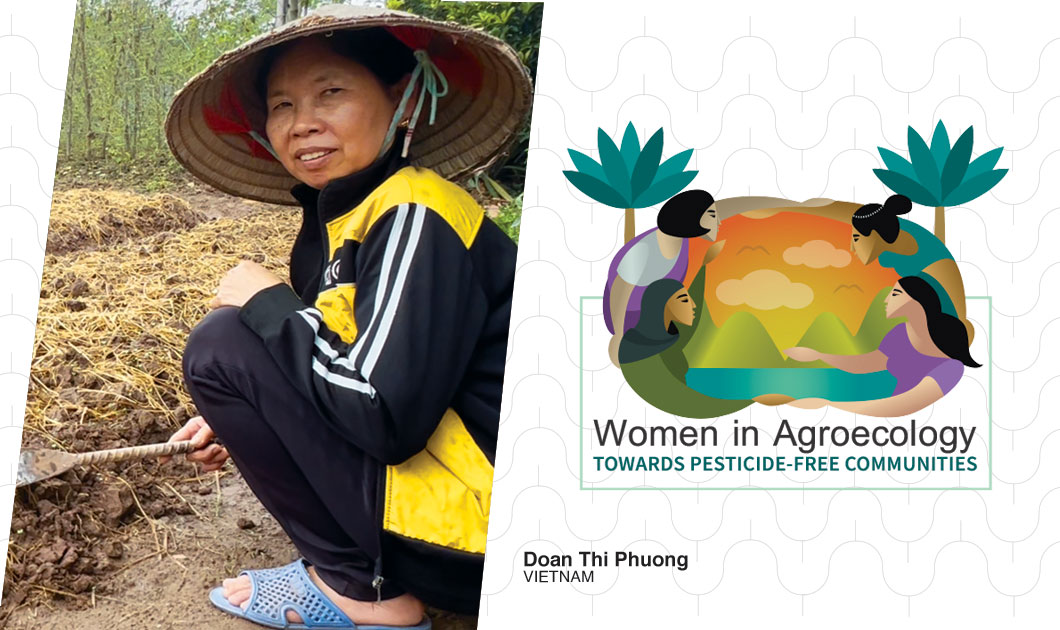Meet Mrs. Doan Thi Phuong, a resilient 58-year-old residing in Hamlet 8, Hai Cuong commune, Hai Hau district, Nam Dinh province. Her story isn’t just about tending to a garden – it’s a testament to the power of sustainable agriculture and the transformation it brings to communities.
With about two acres of land surrounding her humble abode, Phuong cultivates various seasonal vegetables and fruits. From cove beans to pumpkins, her garden thrives with life, serving her family’s needs and providing surplus for neighbours.
In 2017, Phuong embarked on a journey to reduce pesticide use, spurred by an eye-opening session conducted by an agricultural company. Recognizing the harmful impact of pesticides on health and the environment, she turned to eco-friendly alternatives, particularly A2 probiotics. “If I abused a lot of pesticides, I will be the first and most affected to my health,” she reflects.
Becoming a part of the women’s commune in her community was like opening a window to a new world for Phuong. “Being a member of the commune’s women’s union, especially as our Hai Hau district embarks on this new countryside movement, made me realize the importance of environmental protection,” she passionately expressed. “That’s what inspired me to make a change in myself,” she added.
Her decision to embrace agroecology didn’t just revolutionize her farming practices but also revitalize her crops. The vegetables she grew with A2 probiotics boasted unmatched freshness and flavour, starkly contrasting chemically treated produce. This shift benefitted her health and created a greener, more vibrant environment.
Alongside using A2 probiotics, she crafts her own pest-fighting concoctions from ginger, garlic, and chilli peppers. While these herbal remedies may not cure diseases, they’re a natural alternative to pesticides. Phuong is all about sustainable practices, opting for biological pesticides when needed and composting green fertilizer. Plus, she’s no stranger to diversifying her crops to meet her family’s needs and selling to the local village.
Her green thumb isn’t just natural talent – she’s constantly honing her skills. Attending annual training courses hosted by the district agriculture department, she’s armed with knowledge and support. While learning, she’s also actively spread awareness about environmental protection through her involvement in the commune women’s union. From waste classification to green composting, Phuong leads the charge toward a greener future in her community.
But Phuong’s journey wasn’t without its challenges. Initially sceptical about the cost and yield of ecological agriculture, she persevered, driven by a desire for a healthier lifestyle. “Using probiotics will contribute to soil improvement, making my gardening work much easier,” she explains.
Today, Phuong’s garden teems with life, proof of the transformative power of agroecology. Worms wriggle beneath the soil, mantises flutter among the trees – signs of a thriving ecosystem nurtured by sustainable practices.
Yet, Phuong’s aspirations extend beyond her garden. She dreams of scaling her operations and inspiring others in her community to embrace agroecology. “I desire to learn an agroecological model,” she shares, hopeful for a future where ecological agriculture becomes the norm.
Despite the uphill battle of changing ingrained habits, Phuong remains undeterred. “You must be patient and persistent,” she asserts, recognizing the importance of steadfast advocacy in fostering change.
As Phuong tends to her garden, she embodies the spirit of determination. Her story is one of hope, a path toward a more sustainable and equitable future for all.###
Women In Agroecology: Towards Pesticide-Free Communities is a continuing storytelling initiative of PAN Asia Pacific and its partners to document stories of rural women who are survivors of pesticide poisoning and/or making the transition to agroecology.
Our contributing partners for the second installation: Shikkha Shastha Unnayan Karzakram (SHISUK), Bangladesh; Serikat Perempuan Indonesia (SERUNI); Sustainable Agriculture and Environment Development Association (SAEDA), Laos; and Research Centre for Gender, Family and Environment in Development (CGFED), Vietnam








Discussion about this post